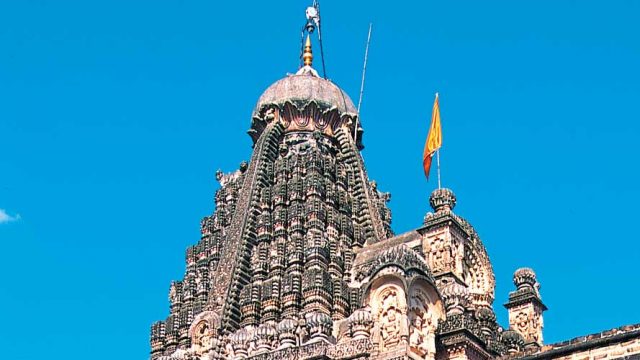Giant banyan trees flank the road to Ghrishneshwar. An hour’s journey from Aurangabad, a temple stands before you on a bowl of flat land fringed by ancient basaltic hills in the distance. Here, devotees visit the last among India’s revered Jyotirlinga shrines, located in a village named Verul.
LEGEND
Sudharma, a learned Brahmin, was childless. His unhappy wife, Sudeha, insisted he marry again. After much persuasion, he married Sudeha’s sister, Ghrishna. Every day, Ghrishna made 108 lingas out of sand, worshipped them, and immersed them in the Ela Ganga river. She soon gave birth to a son. Consumed by jealousy, Sudeha killed the child and dumped his body into the Ela Ganga. When Grishna came to know of this, instead of mourning, she made 108 sand lingas and took them for immersion in the Ela Ganga. Suddenly, her son appeared in the river, with Shiva at his side. She prayed that her sister be forgiven, and that Lord Shiva appear at the same site in her own name, in some other form. Hence, Ghrishneshwar.
THINGS TO SEE AND DO
Ghrishneshwar Jyotirlinga Temple
Originally built by Shivaji’s grandfather, the Ghrishneshwar (also known as Grushneshwar) Temple was reconstructed by Ahilyabai Holkar in 1769. The stone edifice rises in distinct bands of friezes – rust, pink and pale yellow. Devotees first halt at the small shrine to Kokila Mata upon entering the Ghrishneshwar Temple. She keeps her hand over her ear to hear their arrival, and tells Shiva that his devotee has arrived.

The main Trikaal puja and aarti can be witnessed at three different times during the day – 6.00am, noon and 8.00pm daily. During Shravan, a special 9.00pm puja takes place. On Maha Shivaratri (February–March), a palanquin takes the Shiva idol to the nearby Shivalaya Tirth Kund. The deity is brought back to the temple at 6.00pm for all-night prayers.
Shivalaya Tirth Kund
This stunning stepped tank built, Ahilyabai Holkar, is located a short walk from the temple. At the moss-green water’s edge are eight shrines, each with a shivalinga.
WHERE TO STAY AND EAT
The Ghrishneshwar Temple Dharamshala (Tel: 02437-245675, Cell: 09421686834; Tariff: ₹500), has basic accommodation. Vrindavan Lodging (Cell: 09860163162; Tariff: ₹900–1,800) has a restaurant. A good choice would be Hotel Kailas (Tel: 244446; Tariff: ₹2,000–3,500), about half-a-kilometre walk from the temple.
Several dhabas serving Punjabi, Gujarati and Maharashtrian thalis line the road from Aurangabad to Ellora and Ghrishneshwar.
THE INFORMATION
When to go October to March
Tourist Office, MTDC Holiday Resort, Station Road, Aurangabad, Tel: 0240-2331513, 2334259, STD code 02437
Getting There
Region Marathwada
Location Ajanta and Ellora caves are located among the Satmala Hills in Aurangabad District
Distance Ajanta is 491 km NE and Ellora 417 km NE of Mumbai
Route from Aurangabad Via NH211 and Ghrishneshwar Temple Road
Air Nearest airport: Aurangabad (38 km/ 45 mins). Taxi charges ₹1,000 approx for a drop.
Rail Nearest railhead: Aurangabad Station, with direct trains to Mumbai, Delhi, Pune, Hyderabad and many other cities
Road From Aurangabad, take NH211 to Ghrishneshwar via Khuldabad.
Bus MSRTC has bus services from Aurangabad to Ghrishneshwar




